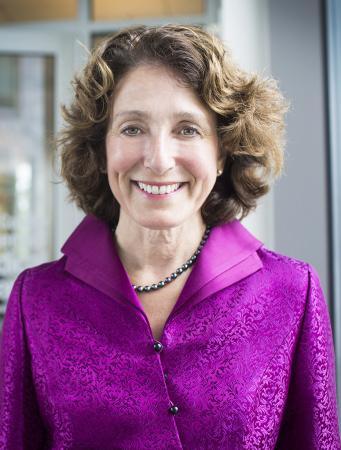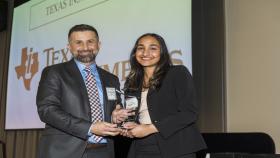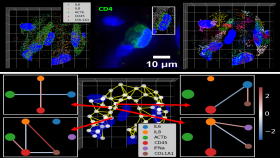On May 22, Susan Margulies was named the Wallace H. Coulter Chair of the Coulter Department of Biomedical Engineering (BME) at Georgia Tech and Emory University, and a Georgia Research Alliance Eminent Scholar in Injury Biomechanics. She is the fourth chair in the department’s history.
In the announcement, Gary May, former dean of Tech’s College of Engineering, said, “Susan has the vision, scholarship, and experience in fields critical to the department that make her ideally suited and prepared to lead.” David Stephens, interim dean, Emory University School of Medicine and vice president for research, Woodruff Health Sciences Center, added, “throughout her career, she has distinguished herself as an educator, scientist, mentor, and a national and international leader in the biomedical sciences.”
Before her official start date of August 1, we sat down with Margulies to ask a few questions and learn more about her view of the Georgia Tech and Emory biomedical engineering collaboration.
What attracted you to the Wallace H. Coulter Department of Biomedical Engineering at Georgia Tech and Emory?
I was particularly attracted to the Coulter Department because it’s a top ranked biomedical engineering department, embedded in both a school of medicine and a college of engineering, that consists of a community of engaged faculty, staff, students, trainees, and alumni who are all passionate about continuing to set an even higher bar for impactful research and education. This is a truly unique department, and I am thrilled to lead the next phase of our journey together.
Based on your extensive interactions with leaders and faculty during the hiring process, have you outlined some initial tasks or priorities?
My goals are to increase the impact, engagement, and the community aspects of this department. Already in two schools, I consider it a high priority to increase opportunities to form and strengthen bridges. I’ll give you some examples. It’s important to increase our partnerships with industry, government, foundations, and alumni to expand our translation of basic science and engineering discoveries to understand disease and improve healthcare. A second type of bridge is to expand our interdisciplinary research and education with partnerships with other entities at Emory and Georgia Tech—and I look forward to those collaborations. A third bridge is to increase opportunities to translate engineering discoveries to biomedical applications. These startup opportunities can originate from our undergraduates, master’s students, doctoral students, trainees, and faculty.
How would you describe your leadership style?
I would describe my leadership style as collaborative, inclusive, and I appreciate the importance of shared governance. I look forward to involving students, faculty, and staff in the future directions of the department. I value the perspectives others bring to the table.
What led you to pursue a career in biomedical engineering?
Growing up in Rochester, Minnesota, home of the Mayo Clinic, I was always interested in applying math and science to improve human health and understand disease. As an undergrad, I was a mechanical and aerospace major, but all of my research projects and summer research experiences were in the area of biomedical engineering. I’ve had a long commitment to using math, science, and engineering to understand and detect diseases, and develop treatments to improve health.
What plans do you have for your research and where will your lab be located?
My research in head injury will continue to focus on how and why head injuries occur in adults and children and to improve detection and treatment strategies. At Georgia Tech, I will be continuing that research, looking at innovative biomarkers and new devices to detect mild traumatic brain injuries. At Emory, my research will be focused on animal models for diffuse as well as focal brain injuries—incorporating developments at Georgia Tech into our preclinical model. I also look forward to close collaborations with Children’s Healthcare of Atlanta and Emory University faculty to improve the outcomes after traumatic brain injuries.
What are your thoughts about the Georgia Research Alliance (GRA) and its benefit to Georgia?
The GRA is focused on the translation of research to new enterprises in Georgia. My conversations with the GRA have linked me with other universities in Georgia and with leaders in industry and translation training. The GRA has opened doors in a very tangible way. Even before my arrival on campus, I am developing research collaborations throughout Georgia!
What are your hopes for the future of the department and its national leadership role in biomedical engineering education, research, and translation into patient care?
My hope for the future of the Coulter Department at Georgia Tech and Emory is that we are the pacesetter when it comes to training the pioneers of tomorrow in the discovery of new BME knowledge and its translation to practice proactive and innovative educational methods. My hope is that we accelerate our research discoveries to improve the lives of others.
Anything else you would like to share?
I want to communicate that my doors are open. I welcome students, faculty, staff, and alumni to visit me during my weekly office hours. I look forward to developing a deeper engagement with the BME community, and together, developing strategic initiatives that enhance our impact, engagement, and community.
- - - - - - - - - - - - - - - -
SUSAN S. MARGULIES
- - - - - - - - - - - - - - - -
Ph.D. Bioengineering, University of Pennsylvania
M.S.E. Bioengineering, University of Pennsylvania
B.S.E. Mechanical Engineering & Aerospace Engineering, Princeton University
Major Research Interests: Biomechanics of brain injury, pediatric head injury, soft tissue mechanics, ventilator-induced lung injury, lung mechanics, pathways of cellular mechanotransduction, and tissue injury thresholds.
Honors and Awards: ALA Young Investigator Award, Whitaker Foundation Young Investigator Award, NSF CAREER Award, Stapp Car Crash Conference Award, S. Reid Warren Award for Distinguished Teaching, Ford Motor Company Award for Faculty Advising, American Society of Mechanical Engineering Award, Association of Women in Science Elizabeth Bingham Award for the Advancement of Women in Science, Fellow - American Institute for Medical and Biological Engineering, Fellow - American Society of Mechanical Engineers, Fellow - Biomedical Engineering Society.
Hobbies: Cooking with family and friends, gardening, traveling, and my morning walks in Piedmont Park.
Media Contact
Walter Rich
Keywords
Latest BME News
Commercialization program in Coulter BME announces project teams who will receive support to get their research to market.
Courses in the Wallace H. Coulter Department of Biomedical Engineering are being reformatted to incorporate AI and machine learning so students are prepared for a data-driven biotech sector.
Influenced by her mother's journey in engineering, Sriya Surapaneni hopes to inspire other young women in the field.
Coulter BME Professor Earns Tenure, Eyes Future of Innovation in Health and Medicine
The grant will fund the development of cutting-edge technology that could detect colorectal cancer through a simple breath test
The surgical support device landed Coulter BME its 4th consecutive win for the College of Engineering competition.
New research from Georgia Tech helps doctors predict how therapies will interact with a child's immune system, potentially improving outcomes and reducing risks.








